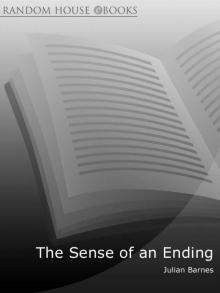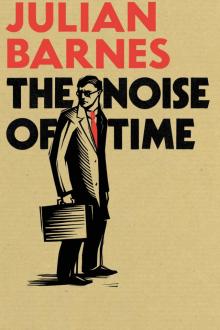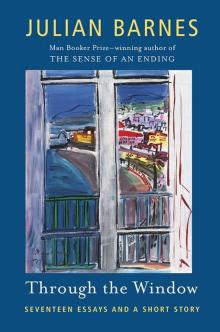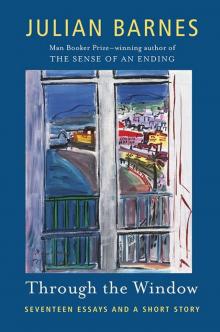- Home
- Julian Barnes
The Noise of Time Page 9
The Noise of Time Read online
Page 9
Anyone with an ounce of political undertsanding would know that he hadn’t written the speeches he gave: the short one on the Friday and the very long one on the Saturday. He was handed them in advance and instructed to prepare his delivery. Naturally, he didn’t. If they chose to rebuke him, he would point out that he was a composer, not a speech-maker. He read the Friday speech in a fast, uninflected gabble, reinforcing the fact that he was quite unfamiliar with the text. He carried straight on over punctuation marks as if they did not exist, pausing neither for effect nor reaction. This has absolutely nothing to do with me, his manner insisted. And while a translator read the English version, he ignored the gaze of Mister Nicolas Nabokov, and did not light a cigarette for fear it would go out.
The next day’s speech was different. He felt its length and weight in his hand, and so, without forewarning those concerned for his welfare, he merely read the first page and sat down, leaving the full text to the translator. As the English version was being read out, he followed the Russian original, curious to discover his own trite views on music and peace and the dangers to each of them. He began by attacking the enemies of peaceful coexistence and the aggressive activities of a group of militarists and hate-mongers who were intent on a third world war. He specifically accused the American government of building military bases thousands of miles from home, of provocatively trampling on its international obligations and treaties, and of perfecting new kinds of weapons of mass destruction. This act of wild discourtesy received a solid round of applause.
He then patronisingly explained to Americans how the Soviet music system was superior to any other on the face of the earth. This many orchestras, military bands, folk groups, choirs – proof of the active use of music in furthering the development of society. So, for instance, the peoples of Soviet Middle Asia and the Soviet Far East had in recent years thrown off the last remnants of the colonial status their cultures had been accorded under Tsarism. Uzbeks and Tajiks, together with other peoples of the far-flung Soviet Union, were benefitting from an unprecedented level and scope of musical development. At this juncture, he made a special point of assailing Mister Hanson Baldwin, military editor of the New York Times, for having written disparagingly of the populations of Soviet Asia in a recent article which naturally he had neither read nor heard of.
Such developments, he went on, inevitably led to a greater closeness and understanding between the People, the Party and the Soviet composer. If the composer must lead and inspire the People, then the People, through the Party, must also lead and inspire the composer. A spirit of active, constructive criticism existed, so that a composer might be warned if he was slipping into errors of petty subjectivity and introspective individualism, of formalism or cosmopolitanism; if – in short – he was losing touch with the People. He himself had not been without fault in this matter. He had departed from the true path of a Soviet composer, from big themes and contemporary images. He had lost contact with the masses and sought to please only a narrow stratum of sophisticated musicians. But the People could not remain indifferent to such straying, and so he had received public criticism which had directed him back to the proper road. It was a failure for which he had apologised and was now apologising again. He would seek to do better in the future.
So far, so banal – at least, he hoped it was to American ears. Another necessary confession of sins, even if at an exotic location. But then his eye skipped ahead and his mind froze. He saw in the text the name of the century’s greatest composer, and an American accent marching towards it. First came a general condemnation of all musicians who believed in the doctrine of art for art’s sake, rather than art for the sake of the masses; an attitude which had led to well-known perversions of music. The outstanding example of such perversion, he heard himself say, was the work of Igor Stravinsky, who had betrayed his native land and severed himself from his people by joining the clique of reactionary modern musicians. In exile, the composer had displayed moral barrenness, as was openly shown in his nihilistic writings, where he dismissed the masses as ‘a quantitative term which has never entered my considerations’, and openly boasted that ‘My music does not express anything realistic.’ He had thus confirmed the very meaninglessness and absence of content of his creations.
The supposed author of these words sat there motionless and unreacting, while inside he felt awash with shame and self-contempt. Why had he not seen this coming? He might have been able to change it, insert some modifications – if only into the Russian text as he read it out. He had foolishly imagined that his public indifference to his own speech would indicate a moral neutrality. That was as stupid as it was naive. He felt stunned, and could barely concentrate as his American voice turned its attention to Prokofiev. Sergei Sergeyevich had also recently strayed from the party line, and was in great danger of relapsing into formalism if he failed to heed the directives of the Central Committee. But whereas Stravinsky was a lost cause, Prokofiev might, if he were watchful, yet find great creative success by following the correct path.
He proceeded to a summing-up in which ardent hopes for world peace were combined with ignorant bigotry about music, for which he again received enormous applause. It was practically a Soviet ovation. There were some harmless questions from the floor, which he negotiated with the help of his translator and a friendly adviser who suddenly appeared beside his other ear. But then he saw a tweed-jacketed figure rise to his feet. This time not in the front row, but in a position from which the audience could see and hear the interrogation that now followed.
Mister Nicolas Nabokov began by explaining, with suave offensiveness, that he quite understood that the composer was here in an official capacity, and that the opinions expressed in his speech had been those of a delegate from Stalin’s regime. But he wanted to pose some questions to him not as a delegate but rather as a composer – from one composer to another, as it were.
‘Do you subscribe to the wholesale and bilious condemnation of Western music as daily expounded in the Soviet press and by the Soviet government?’
He felt the adviser’s presence at his ear, but had no need of him. He knew what to answer because there was no choice. He had been led through the maze to the final room, the one containing no food as a reward, merely a trapdoor beneath his paws. And so, in a muttered monotone, he replied,
‘Yes, I personally subscribe to those opinions.’
‘Do you personally subscribe to the banning of Western music in Soviet concert halls?’
This allowed him a little more room for manoeuvre, and he replied,
‘If music is good, it will be played.’
‘Do you personally subscribe to the banning from Soviet concert halls of the works of Hindemith, Schoenberg and Stravinsky?’
Now he felt the sweat begin to drip behind his ears. As he took a little time with the translator, he thought briefly of the Marshal gripping his pen.
‘Yes, I personally subscribe to such actions.’
‘And do you personally subscribe to the views expressed in your speech today about the music of Stravinsky?’
‘Yes, I personally subscribe to such views.’
‘And do you personally subscribe to the views expressed about your music and that of other composers by Minister Zhdanov?’
Zhdanov, who had persecuted him since 1936, who had banned him and derided him and threatened him, who had compared his music to that of a road drill and a mobile gas chamber.
‘Yes, I personally subscribe to the views expressed by Chairman Zhdanov.’
‘Thank you,’ said Nabokov, looking around the hall as if expecting applause. ‘All is now perfectly clear.’
There was a story about Zhdanov much repeated in Moscow and Leningrad: the story of the music lesson. Gogol would have approved it; indeed, might even have written it. After the Central Committee’s Decree of 1948, Zhdanov had instructed the country’s leading composers to assemble at his ministry. In some versions, it was just himself and Prokofiev; in others,
the whole slew of sinners and bandits. They were shown into a large room; on a platform stood a dais, and beside it a piano. There were no refreshments: no vodka to take the edge off one’s fear, no sandwiches to quieten the stomach. They were kept waiting for some while. Then Zhdanov appeared with a pair of junior officials. He went to the dais and gazed down at the wreckers and saboteurs of Soviet music. He lectured them once again on their wickedness, delusion and vanity. He explained how, if they did not mend their ways, their game of clever ingenuity might end very badly. And then, just at the point where he had the composers shitting themselves, he produced a coup de théâtre. He went to the piano and gave them a masterclass. This – he thumped away discordantly, making the keys quack and grunt – was decadent, formalist music. And this – he played a soupy neo-romantic air, which in a film might accompany some previously haughty girl at last acknowledging her love – this was the graceful, realistic music of the kind the People craved and the Party demanded. He stood up, gave a mocking half-bow, and dismissed them with the back of his hand. The nation’s composers had filed out, some promising to do better, others hanging their heads in shame.
It had never happened, of course. Zhdanov had lectured them until their ears bled, but was too clever to let his fat fingers desecrate the keyboard in that way. Even so, the story gained authority with each retelling, until some of those allegedly present had confirmed that, yes, it had happened exactly like that. And part of him wished that this conversation with Power, in which Power had arrogantly chosen its opponents’ weapon, had really taken place. Nevertheless, it swiftly joined the songbook of believable myths circulating at this time. What mattered was not so much whether a particular story was factually true, but rather, what it signified. Though it was also the case that the more a story circulated, the truer it became.
He and Prokofiev had been attacked together, humiliated together, banned together and unbanned together. Yet in his opinion Sergei Sergeyevich never really understood what was going on. He was not a coward, either in his life or his music; but he saw it all – even Zhdanov’s crazed and murderous attacks on the intelligentsia – as a personal problem to which there was, somewhere, a solution. Here was music, and here was his own particular talent; there lay Power, and bureaucracy, and politico-musicological theory. It was just a question of how the accommodation could be made so that he could go on being himself and writing his music. Or, to put it another way: Prokofiev completely failed to see the tragic dimension of what was happening.
One other good thing about the trip to New York: his tail-suit had been a success. It had fitted him very well.
He wondered, as the plane made its descent towards Reykjavik, if he should summon the stewardess and ask for a benzedrine inhaler. It could hardly make any difference now.
It was, he supposed, just possible that Nabokov, in some elaborate way, was being sympathetic to his plight, was trying to explain to the other delegates the true nature of this public masquerade. But if so, he was either a paid stooge or a political imbecile. In order to demonstrate the lack of individual freedom beneath the sun of Stalin’s constitution, he was happy to sacrifice an individual life. Because that was what he was doing: If you don’t want to Jump Thru The Window, why not put your head into this noose I’ve plaited for you? Why not tell the truth and die?
One of the pickets outside the Waldorf Astoria had carried a placard reading SHOSTAKOVICH – WE UNDERSTAND! How little they understood, even those like Nabokov who had lived some little time under Soviet power. And how smugly they would return to their cosy American apartments, happy to have put in a good day’s work for virtue and liberty and world peace. They had no knowledge, and no imagination, these brave Western humanitarians. They came to Russia in eager little gangs, armed with vouchers for hotels and lunches and dinners, each one of them approved by the Soviet state, each keen to meet ‘real Russians’ and find out ‘how they really felt’ and ‘what they really believed’. Which was the last thing they would be told, because you did not need to be paranoid to know that each group would contain an informant, and their guides would also be dutifully reporting back. One such gang had a meeting with Akhmatova and Zoshchenko. This was another of Stalin’s tricks. You have heard that some of our artists are persecuted? Not at all, that is just your government’s propaganda. You wanted to meet Akhmatova and Zoshchenko? Look, here they are – ask them whatever you wish.
And this group of Western humanitarians, already confirmed in their doe-eyed enthusiasm for Stalin, couldn’t think of anything cleverer than to ask Akhmatova what she thought about Chairman Zhdanov’s remarks and the Central Committee’s resolution condemning her. Zhdanov had said that Akhmatova was poisoning the consciousness of Soviet youth with the rotten and putrid spirit of her poetry. Akhmatova got to her feet and replied that she considered both Chairman Zhdanov’s speech and the Central Committee’s resolution to be absolutely correct. And those concerned visitors had gone away clutching their meal vouchers and repeating to one another that the Western view of Soviet Russia was all a malign fantasy; that artists were not only well treated, but allowed to engage in constructive critical exchanges with even the highest echelons of Power. All of which proved how much more greatly the arts were valued in Russia than in their own decadent homelands.
But he was more revolted by the famous Western humanitarians who came to Russia and told its inhabitants they were living in paradise. Malraux, who praised the White Sea Canal without ever mentioning that its constructors were worked to death. Feuchtwanger, who fawned over Stalin and ‘understood’ how the show trials were a necessary part in the development of democracy. The singer Robeson, loud in his applause for political killing. Romain Rolland and Bernard Shaw, who disgusted him the more because they had the temerity to admire his music while ignoring how Power treated him and all other artists. He’d refused to meet Rolland, pretending to be ill. But Shaw was the worse of the two. Hunger in Russia? he had asked rhetorically. Nonsense, I’ve been fed as well as anywhere in the world. And it was he who said, ‘You won’t frighten me with the word “dictator”.’ And so the credulous fool hobnobbed with Stalin and saw nothing. Though why indeed should he be afraid of a dictator? They hadn’t had one in England since the days of Cromwell. He had been forced to send Shaw the score of his Seventh Symphony. He should have added to his signature on its title page the number of peasants who had starved to death while the playwright was gorging himself in Moscow.
Then there were those who understood a little better, who supported you, and yet at the same time were disappointed in you. Who did not grasp the one simple fact about the Soviet Union: that it was impossible to tell the truth here and live. Who imagined they knew how Power operated and wanted you to fight it as they believed they would do in your position. In other words, they wanted your blood. They wanted martyrs to prove the regime’s wickedness. But you were to be the martyr, not them. And how many martyrs would it take to prove that the regime was truly, monstrously, carnivorously evil? More, always more. They wanted the artist to be a gladiator, publicly fighting wild beasts, his blood staining the sand. That’s what they required: in Pasternak’s words, ‘Total death, seriously.’ Well, he would try to disappoint such idealists for as long as possible.
What they didn’t understand, these self-nominated friends, was how similar they were to Power itself: however much you gave, they wanted more.
Everyone had always wanted more from him than he was able to give. Yet all he had ever wanted to give them was music.
If only things were so simple.
In the imaginary conversations he sometimes had with these disappointed supporters, he would begin by explaining one small, basic fact of which they were almost certainly ignorant: that it was impossible in the Soviet Union to buy manuscript paper unless you were a member of the Union of Composers. Did they know that? Of course not. But Dmitri Dmitrievich, they would doubtless reply, if that is the case, surely you can buy blank paper, and with a ruler and pencil make your
own? Surely you are not so easily put off practising your art?
Very well, he might reply, then let’s start at the other end of things. If you are declared an enemy of the state, as he had once been, all those around you are tarnished and infected. Your family and friends, of course. But even a conductor who plays, or has played, or suggests playing, a work of yours; the members of a string quartet; the concert hall, be it ever so tiny, that stages your work; the very audience. How often, over the course of his career, had conductors and soloists suddenly become unavailable at the last minute? Sometimes from natural fear or understandable caution, sometimes after a hint from Power. Anyone, from Stalin down to Khrennikov, could stop his work being performed throughout the entire country for as long as they chose. They had already killed his career as a composer of opera. In his early years, many thought – and he had agreed with them – that this was where his best work would be done. But since they murdered Lady Macbeth of Mtsensk, he had not had an opera produced; nor finished any he had begun.
But surely, Dmitri Dmitrievich, you could write in the secrecy of your apartment; you could circulate your music; it could be played among friends; it could be smuggled out to the West like the manuscripts of poets and novelists? Yes, thank you, an excellent idea: new music of his, banned in Russia, played in the West. Could they imagine what a target that would make of him? It would be perfect proof that he was seeking to restore capitalism in the Soviet Union. But you could still write music? Yes, he could still write unperformed and unperformable music. But music is intended to be heard in the period when it is written. Music is not like Chinese eggs: it does not improve by being kept underground for years and years.

 The Sense of an Ending
The Sense of an Ending The Noise of Time
The Noise of Time Metroland
Metroland Letters From London
Letters From London Before She Met Me
Before She Met Me Pulse
Pulse Flaubert's Parrot
Flaubert's Parrot England, England
England, England The Porcupine
The Porcupine The Only Story
The Only Story Love, Etc
Love, Etc Through the Window: Seventeen Essays and a Short Story
Through the Window: Seventeen Essays and a Short Story Staring at the Sun
Staring at the Sun Cross Channel
Cross Channel Levels of Life
Levels of Life Arthur & George
Arthur & George Love, Etc.
Love, Etc. A History of the World in 10 1/2 Chapters
A History of the World in 10 1/2 Chapters Something to Declare
Something to Declare Through the Window: Seventeen Essays and a Short Story (Vintage International)
Through the Window: Seventeen Essays and a Short Story (Vintage International)